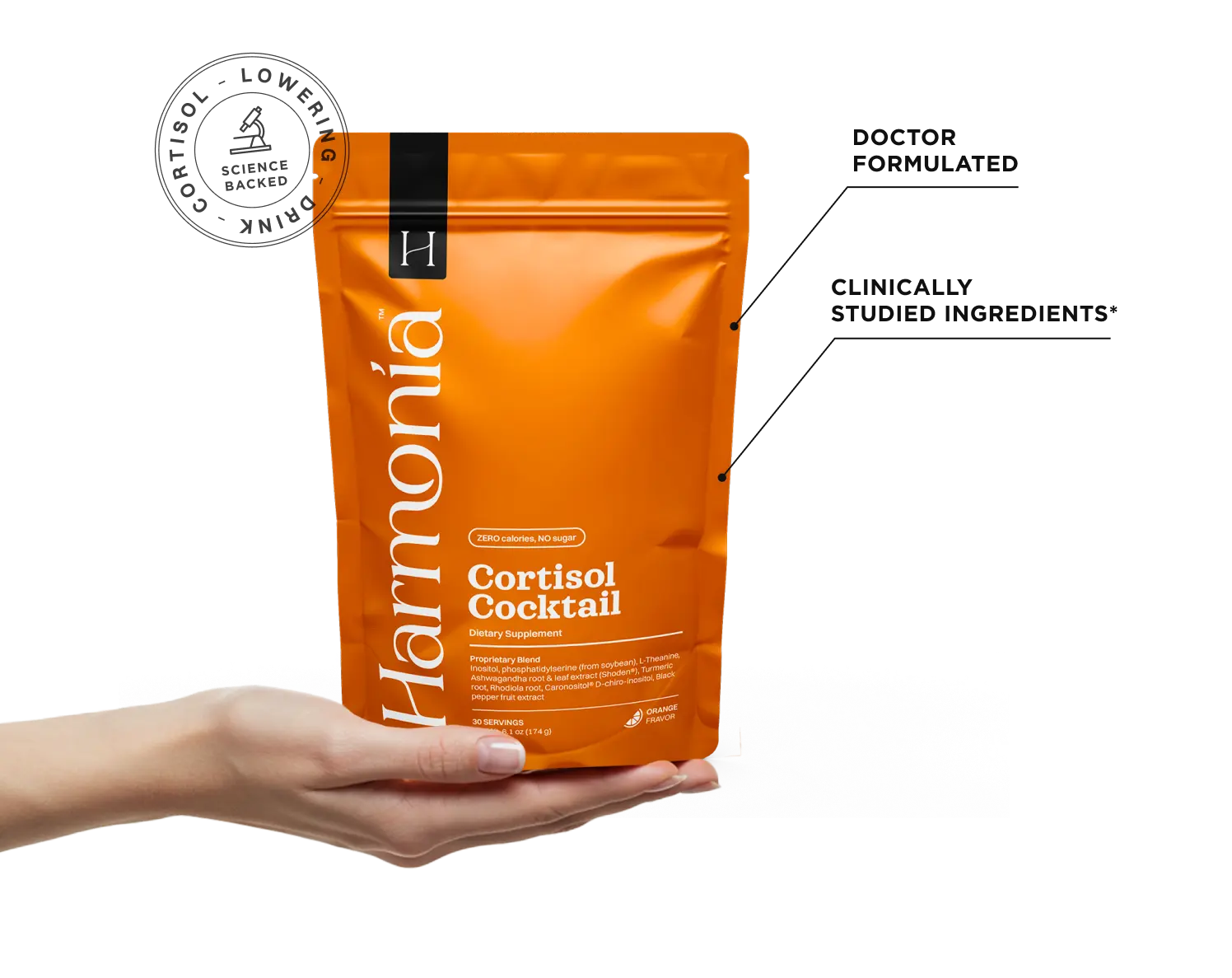Modern life keeps most women in constant motion - balancing work, family, and endless to-do lists. While this fast-paced rhythm might seem normal, it often keeps the body in a prolonged state of stress.
What many women don’t realize is that this stress directly affects their hormones - especially the delicate estrogen and cortisol relationship.
Cortisol is the body’s main stress hormone, responsible for managing energy and alertness. Estrogen, meanwhile, regulates mood, fertility, metabolism, and overall well-being.
When cortisol levels stay high for too long, it can suppress estrogen production, throw off your menstrual cycle, and create what many describe as stress-induced hormonal imbalance.
Understanding how these two hormones interact is key to restoring balance, energy, and calm in your daily life.
Understanding Estrogen and Cortisol
Estrogen is one of the most important hormones in a woman’s body. It helps regulate menstrual cycles, supports bone density, stabilizes mood, and plays a crucial role in metabolism and brain health.
When estrogen levels drop too low, symptoms such as anxiety, fatigue, hot flashes, or sleep disturbances often appear.
Cortisol, on the other hand, is produced by the adrenal glands and released in response to stress. In short bursts, cortisol is beneficial - it helps you wake up, stay focused, and respond to challenges.
But when stress becomes chronic, cortisol production remains high, disrupting the balance of other hormones like estrogen and progesterone. This is the root of stress and hormonal imbalance that many women experience daily.
How Stress Affects Hormonal Balance
The relationship between cortisol and estrogen works like a seesaw. When cortisol rises, estrogen often falls. This happens because the body prioritizes stress survival over reproduction and hormonal stability.
Over time, high cortisol levels can lower estrogen, affect ovulation, and increase the risk of fatigue, anxiety, and irregular periods. Conversely, very low cortisol can leave you feeling drained, foggy, and emotionally flat - often accompanied by low estrogen and cortisol levels.
This hormonal interplay also influences progesterone, another key female hormone. High cortisol reduces progesterone availability, leading to mood changes, bloating, and increased PMS symptoms.
The overall effect of cortisol on estrogen and progesterone is a cascade of imbalances that impact mood, sleep, and metabolism.
Can Stress Cause Hormonal Imbalance in Females?

Yes - chronic stress absolutely can. When you live in a constant state of tension, your brain signals the adrenal glands to produce more cortisol. This drains resources that would otherwise go toward making reproductive hormones like estrogen.
Some women also experience the opposite effect - temporary spikes in estrogen due to inflammation or disrupted detoxification - creating high estrogen and cortisol patterns that cause anxiety, irritability, and water retention.
Whether estrogen drops too low or fluctuates unpredictably, stress is often at the core.
This “cortisol steal” phenomenon - where your body diverts resources to make more cortisol - explains how stress affects female hormones. The result is a mix of fatigue, poor sleep, cravings, and hormonal symptoms that can feel impossible to control.
Symptoms of Cortisol–Estrogen Imbalance
When cortisol and estrogen fall out of alignment, you may experience:
- Irregular or painful menstrual cycles
- PMS or perimenopausal symptoms worsening
- Restless sleep or frequent waking
- Cravings for sugar or carbs
- Fatigue despite adequate sleep
- Weight gain, especially around the belly
- Anxiety, irritability, or emotional swings
These symptoms reveal how cortisol affects estrogen - creating both emotional and physical imbalance. Over time, this can contribute to metabolic issues, mood instability, and reproductive changes.
Natural Ways to Support Hormonal Balance
Supporting hormonal health begins with managing cortisol naturally. Start by prioritizing restorative sleep, which helps regulate both cortisol and estrogen rhythms. Move your body regularly through gentle exercise like yoga, stretching, or walking.
High-intensity training may be beneficial short-term, but overdoing it can elevate cortisol and make hormonal imbalance worse.
Nutrition also plays a major role. Focus on protein-rich meals, leafy greens, and healthy fats to stabilize blood sugar and support estrogen production.
Stay hydrated, limit caffeine, and include magnesium-rich foods for relaxation and hormone support.
Mindfulness practices like meditation, deep breathing, or journaling reduce the body’s stress response and help prevent cortisol spikes. These small daily actions make a big difference in how stress affects your hormones.
Adaptogens and key nutrients are another effective way to rebalance:
- Ashwagandha helps lower cortisol and stabilize mood.
- Rhodiola Rosea enhances stress resilience and boosts energy.
- L-Theanine promotes calm focus and better sleep.
- Myo-Inositol and D-Chiro Inositol improve insulin sensitivity and support reproductive hormone health.
These are the same clinically studied ingredients found in Harmonia’s cortisol-balancing blend, carefully formulated to help women manage stress and support estrogen and progesterone levels.
With consistent use, this daily ritual complements lifestyle changes, helping you feel calm, focused, and in sync again - naturally.
How Harmonia Helps Rebalance Estrogen and Cortisol

Harmonia cortisol cocktail was created to help women restore balance in their hormones by supporting the natural estrogen and cortisol relationship. This advanced cortisol-lowering formula blends adaptogens, vitamins, and nutrients proven to reduce stress and promote hormonal stability.
Each serving contains L-Theanine for calm focus, Ashwagandha to lower cortisol, and Rhodiola Rosea for improved stress resilience.
Myo-Inositol and D-Chiro Inositol work together to balance reproductive hormones, while Turmeric and Phosphatidylserine support brain health and inflammation control. Black Pepper extract boosts nutrient absorption, ensuring maximum effectiveness.
The results speak for themselves:
- 91% of women reported reduced anxiety and stress levels
- 74% experienced improved hormonal balance and better menstrual health
- 95% noticed higher energy and more restful sleep
Harmonia is vegan, sugar-free, and designed for women facing stress, PCOS, menopause, or thyroid-related imbalances. It’s more than a supplement - it’s a science-backed daily ritual for restoring calm and control.
Conclusion
The estrogen and cortisol relationship affects nearly every system in the body - mood, metabolism, energy, and sleep. Chronic stress can disrupt this delicate connection, leading to fatigue, irregular cycles, and emotional ups and downs.
But by lowering cortisol and supporting hormonal function naturally, it’s possible to reclaim balance and vitality.
Lifestyle choices, nutrient-dense foods, and adaptogenic support all play a role. Harmonia makes it simple to address the hormonal effects of stress and bring your body back into alignment.
Ready to feel balanced again? Take the short quiz on the Harmonia website to discover your personalized plan for lowering cortisol, supporting estrogen, and restoring your hormonal harmony.
References
- Dedovic, K., Duchesne, A., Andrews, J., Engert, V., & Pruessner, J. C. (2009). The brain and the stress axis: the neural correlates of cortisol regulation in response to stress. Neuroimage, 47(3), 864-871. Link.
- Payne, J. L. (2003). The role of estrogen in mood disorders in women. International Review of Psychiatry, 15(3), 280-290. Link.







